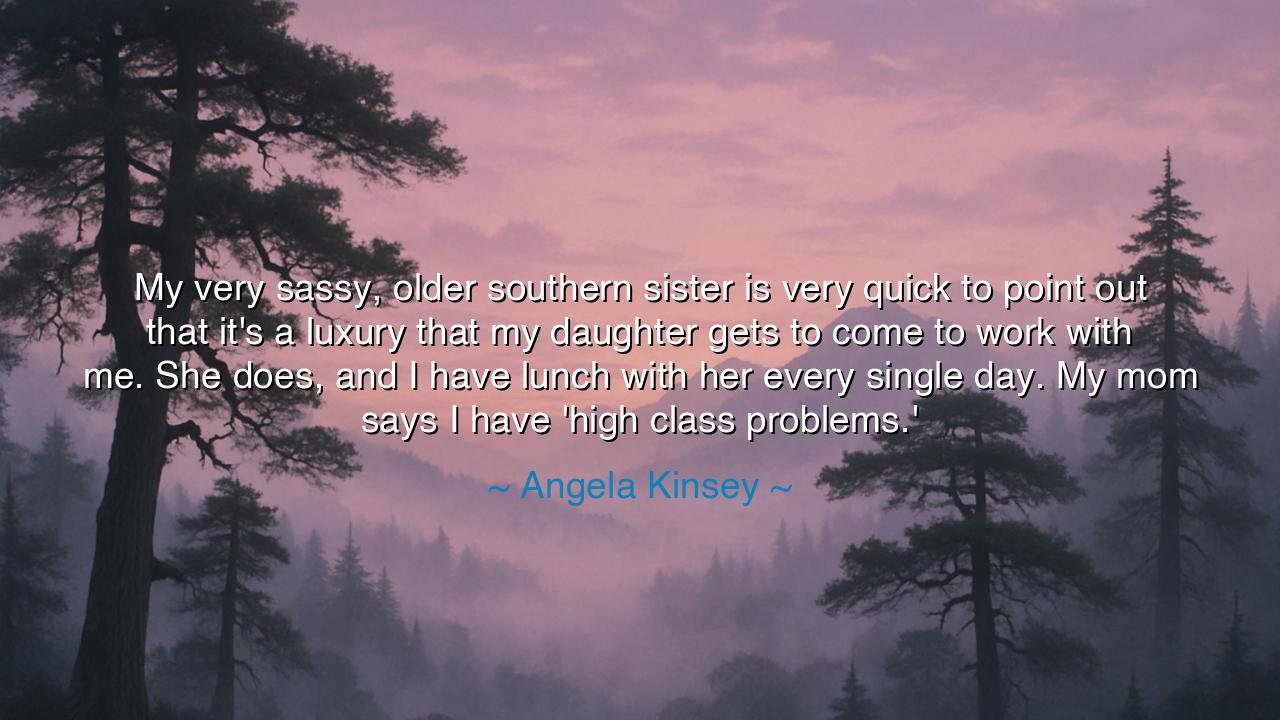
My very sassy, older southern sister is very quick to point out
My very sassy, older southern sister is very quick to point out that it's a luxury that my daughter gets to come to work with me. She does, and I have lunch with her every single day. My mom says I have 'high class problems.'






Hear the words of Angela Kinsey, spoken with humor but laced with wisdom: “My very sassy, older southern sister is very quick to point out that it’s a luxury that my daughter gets to come to work with me. She does, and I have lunch with her every single day. My mom says I have ‘high class problems.’” At first, these words seem lighthearted, the banter of family teasing, but within them lies an ancient truth: that blessings, though they may come with challenges, are blessings still, and that to see them as burdens is to forget their worth.
The heart of this saying lies in the recognition of perspective. Kinsey acknowledges that what she experiences as difficulty—juggling the demands of work while raising a child—is, in fact, a form of privilege. She is reminded by her family that to share lunch with her daughter daily, to bring her into her working life, is a gift not afforded to many. These so-called high class problems are not sorrows but signs of abundance, problems born not of poverty but of plenty.
The ancients too warned against forgetting perspective. The philosopher Seneca taught that wealth and success often create their own difficulties, but these are not the same as true suffering. To have more to manage is still to have more. Likewise, in the wisdom literature of the East, the sage counseled gratitude even in small trials, for they are reminders of the blessings that underlie them. Kinsey’s mother, in naming her struggles “high class problems,” speaks with this same ancient wisdom: do not confuse inconvenience with true misfortune.
Consider the story of Marie Curie, who labored in a poorly ventilated shed with her husband Pierre, surrounded by toxic fumes as they sought to uncover the secrets of radium. Her “problems” were not of privilege but of survival—poverty, exhaustion, and danger at every turn. And yet, out of those struggles came discoveries that changed the world. When measured against such trials, the modern burdens of balancing luxury and opportunity are revealed for what they are: gifts, lightly disguised as difficulties.
Yet there is nobility in Kinsey’s acknowledgment of this. To call something a luxury is to honor its rarity. Many parents are separated from their children by distance, by long hours of labor, by economic need. To share daily meals with one’s child is to dwell in a state of grace, however chaotic it may sometimes feel. By admitting her sister’s and mother’s words, Kinsey teaches us to look upon our own lives with honesty and humility, recognizing when our complaints are, in fact, the echoes of blessing.
The lesson for us, children of tomorrow, is this: measure your trials carefully. Ask yourself whether your struggles are born of deprivation, or of abundance. If they are the latter, then let gratitude temper your frustration. To have high class problems is not to be free of difficulty, but it is to remember that life could have given far harsher burdens. Gratitude does not erase challenge, but it transforms it into perspective, and perspective transforms weariness into joy.
Practical wisdom calls to us: when you complain, pause and ask—Is this a true hardship, or a hidden blessing? When you feel burdened, remember those who carry heavier loads without choice. Share your time, as Kinsey shares lunch with her daughter, and treasure the ordinary moments that others long for. And above all, cultivate humility, so that you never mistake privilege for suffering, nor forget the gifts that shape your days.
Thus, the words of Angela Kinsey endure not merely as family banter, but as a gentle reminder: “My mom says I have high class problems.” May we, too, learn to see our so-called problems in the light of gratitude, and may we measure our lives not only by our burdens, but by the blessings hidden within them. For to recognize abundance, even in difficulty, is the beginning of wisdom and the seed of joy.






AAdministratorAdministrator
Welcome, honored guests. Please leave a comment, we will respond soon